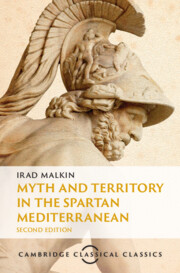Book contents
- Frontmatter
- Dedication
- Contents
- Maps
- Foreword
- Acknowledgements
- Abbreviations
- Note
- Introduction to the Second edition
- Introduction
- 1 The ‘colony of the Dorians’ and the Return of the Herakleidai
- 2 The Homeric king of Sparta: Menelaos in a Spartan Mediterranean
- 3 Spartan colonization in the Aegean and the Peloponnese
- 4 Taras: native hostility, territorial possession, and a new-ancient past
- 5 Foundation and territory: the cults of Apollo Karneios and Zeus Ammon
- 6 Myth and colonial territory: Libya
- 7 Promises unfulfilled: Dorieus between North Africa and Sicily
- 8 Myth and decolonization: Sparta’s colony at Herakleia Trachinia
- Bibliography
- Index
6 - Myth and colonial territory: Libya
Published online by Cambridge University Press: 31 October 2024
- Frontmatter
- Dedication
- Contents
- Maps
- Foreword
- Acknowledgements
- Abbreviations
- Note
- Introduction to the Second edition
- Introduction
- 1 The ‘colony of the Dorians’ and the Return of the Herakleidai
- 2 The Homeric king of Sparta: Menelaos in a Spartan Mediterranean
- 3 Spartan colonization in the Aegean and the Peloponnese
- 4 Taras: native hostility, territorial possession, and a new-ancient past
- 5 Foundation and territory: the cults of Apollo Karneios and Zeus Ammon
- 6 Myth and colonial territory: Libya
- 7 Promises unfulfilled: Dorieus between North Africa and Sicily
- 8 Myth and decolonization: Sparta’s colony at Herakleia Trachinia
- Bibliography
- Index
Summary
Territorial myths may ’open up’ the territory, articulating rights or telling how it became possible to inhabit it, or they may ’close’ it, delimiting it and explaining why it is ’full’. Opening myths function either through an expressly articulated charter or through the identification of certain mythic scenes and events with particular places. Such localizations, involving the concretization and remapping of mythic geography, are rather flexible and seem to have evolved as the Greek colonies expanded. ’Closing myths’, on the other hand, express the end of expansion by defining (and justifying) territorial limits. Both these types are classified as historical myths – myths that function in history, have a dynamic relation with it, and are subject to changes because of it.
- Type
- Chapter
- Information
- Myth and Territory in the Spartan Mediterranean , pp. 169 - 191Publisher: Cambridge University PressPrint publication year: 2024

